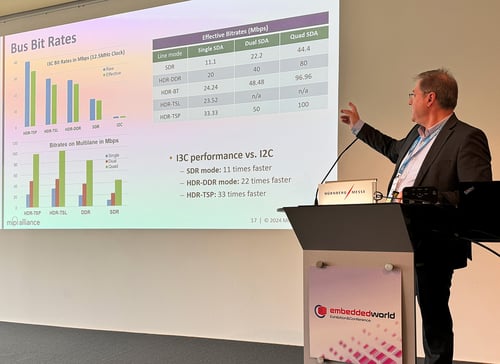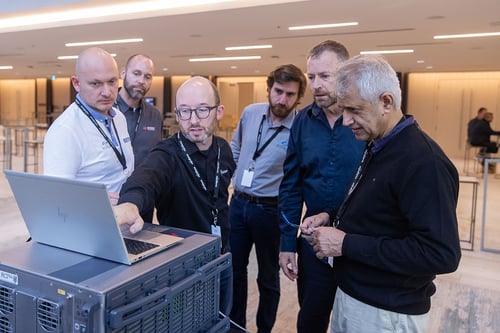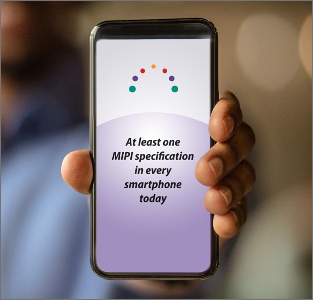4 min read
Velinktech’s A-PHY Automotive SerDes Chipset Enters Mass Production: Q&A With Velinktech CTO
![]() Sharmion Kerley, MIPI Director of Marketing and Membership
:
25 September 2025
Sharmion Kerley, MIPI Director of Marketing and Membership
:
25 September 2025

- News & Events
- News
- Blog
MIPI A-PHY® recently reached a significant milestone in its evolution: Becoming the first SerDes standard to enter mass production with a global automotive OEM. (See the MIPI press release announcing this development.)
Contributor member Velinktech’s high-speed A-PHY automotive SerDes chipset recently entered mass production in the 06 Relive compact SUV model by Lynk & Co, a global automotive brand established in 2016 as a joint venture between Geely Auto Group and Volvo Car Group.
We visited with Dr. Jikai Chen, CTO, Velinktech, to learn more about this exciting accomplishment.
Q: Tell us about Velinktech and your experience with MIPI A-PHY.
A: Velinktech is a fabless silicon vendor focusing on in-vehicle networking solutions. We started in 2020, the same year that MIPI A-PHY v1.0 was released. To our knowledge, we were the first company to work on A-PHY in China, and now are the first to mass produce an A-PHY chipset in a car. One thing that sets us apart is our extensive technical expertise in high-speed wireline communication and the automotive electronic environment. I like to highlight that while our company is young, each member of our core team has about 20 years of professional experience.
In past years, proprietary solutions have sufficiently served the automotive SerDes market. But with the explosive growth of high-speed links for sensing and infotainment in cars, it has become apparent that the industry needs an open standard for better performance, lower cost, richer features and safer supply chains. As the world’s first open automotive SerDes standard, A-PHY’s advent in 2020 was very well-timed, and Velinktech almost immediately embraced the benefits of MIPI A-PHY for its automotive SerDes solutions.
That has turned out to be one of the best decisions we’ve made. The technology is superior, and MIPI as an organization nurtures a strong sense of collaboration. Earlier this year we were among seven silicon vendors who completed interoperability testing with Valens Semiconductor. Achieving end-to-end interoperability among multiple suppliers is a pivotal milestone because that is essentially the point of having an open standard. The interop testing confirmed strong product maturity for A-PHY silicon and was a key step toward fostering broad adoption of A-PHY. Speaking of adoption, we have been quite pleased with the traction of A-PHY in China, which as we know is the world’s largest producer and consumer of automobiles. There is already a robust ecosystem of companies developing silicon and final products based on A-PHY technology.
I’d like to take the opportunity to thank our peer A-PHY silicon vendors, especially Valens. In a sense, we are competitors, but at the same time we realize we need to work together in order for this fabulous technology to succeed. It felt great, sometimes surreal, to work so closely and openly with our competitors for the benefit of the ecosystem.
Q: Understanding there are other standardized and proprietary automotive SerDes solutions, why did you choose A-PHY for your chipsets?
A: Instead of retrofitting an existing technology, MIPI developed the A-PHY specification and tailored various technical aspects specifically for automotive applications, including the dynamic re-transmission technology, and the efficient encoding and modulation schemes, to name a few. A-PHY offers many technical advantages over other standardized and proprietary solutions. It delivers high speed (up to 32Gbps/channel) over long distances (up to 15m or even beyond) with exceptional reliability (10-19 PER) in the harsh automotive environment, all in a cost-effective manner.
In addition to the specification’s technical advantages, A-PHY has a strong ecosystem of more than 50 companies that are designing products based on the specification. MIPI’s end-to-end, full-stack of connectivity solutions (known as MIPI MASS) for the growing number of cameras, sensors and displays that enable automotive applications, along with its support resources, offer global OEMs and vendors economies of scale, reduced costs and increased choices.
Another contributing factor to the industry coalescing around the A-PHY SerDes standard is that MIPI is rolling out an A‑PHY Compliance Program, which will allow automotive OEMs and system designers to validate that MIPI A-PHY devices have been tested and deemed compliant with the specification. The A‑PHY Working Group has already held several successful test events to support the program's development.
Q: What was Geely Auto Group looking for in a chipset?
A: Geely Auto Group was looking for ALL of the key attributes: performance, reliability, power, cost, ease of use—you name it. Low power is a big selling point because thermal management in the tight, fully enclosed camera module is always a challenge. Resilience is also of great importance. They have zero, I mean absolutely zero, tolerance toward video artifacts when the system is zapped with a ESD gun. A-PHY’s re-transmission technology really shines here.
Yet another example is the ease of use. Our package is pin-to-pin compatible with Geely's previous solution. This minimizes not only their design effort, but also the risk, since the system design has largely withstood the test of time.
Q: How challenging was it to move from a test environment to mass production?
A: To say it’s hard would be an understatement. To us, certifications such as AEC-Q100 are the bare minimum. We tackle the challenge of mass production at multiple levels from time zero. The circuits and layouts were well thought out and painstakingly checked. A passing simulation result is not enough, and a design has to be correct by construction. PVT (process, voltage and temperature) variations are addressed across the board. For example, the standard deviation of our on-chip LDO (low dropout) is way below 1% even without OTP (one-time programming).
Long-term effects such as aging, overstress, electro-migration are all meticulously evaluated. All of these performance metrics and practices provide us with a solid foundation for high-quality products.
Despite the effort up front, we all know that outliers happen and because of that, testing is our gatekeeper. We built more than enough testability into our designs, and our test programs not only check the final functions, but also the health of sub-blocks. Then we layer in a continuous-improvement program to monitor and tweak the processes when necessary. This is a scathing yet rewarding experience, and the result is right here: the world's first A-PHY chipset in large-scale commercial use.
Q: What’s on the horizon for Velinktech?
A: We have full confidence in A-PHY’s performance and value, and are committed to a broad portfolio and a long-term roadmap based on this technology. The mass production of our 2G and 4G products is a brilliant start, and we are vigorously readying our future-generation products. Our 8G solution is sampling, and 12G silicon is making great progress over high and low temperatures in the lab. If you guess that even higher speeds are in the pipeline, you are right.
In addition, I am very proud of the low power, small die size and high reliability that we have, but we are continuing to push the envelope and executing solid plans on these fronts. In short, very exciting things are on the horizon. Please stay tuned for more OEM design wins and product announcements in the months ahead.






